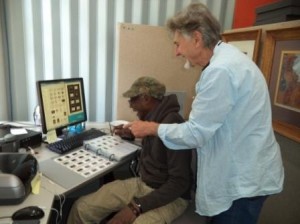
Kivubiro Tabawebbula and Barry Craig Working on the Africa Digitisation Project at the South Australian Museum October 2014
In the 1990s, When founding member and former AFSAAP president Prof. David Dorward photographed as many collections of African material culture as he could get access to in Australia and New Zealand, he may not of realised that these colour slides would need to be digitised 25 years later. Fortunately AFSAAP has been able to commit $10,000 to the initial stage of this wider project, to get the ball rolling. AFSAAP would like to invite sponsors to assist in completing this project. Australian resource companies working in Africa would benefit from participating as a sponsor in this project, to demonstrate their commitment to preserving African material culture. We would also invite small or large, individual or crowd funding to be able complete the project. Further details of how the project will unfold to completion are detailed below.
Background and Project Plan
Prof David Dorward visited the following institutions and photographed near 6000 items – Abby Museum, Caboolture, Queensland; Anthropology Museum of University of Queensland; Queensland Museum; Material Culture Unit at James Cook University; Australian Museum, Sydney; Macleay Museum, University of Sydney; Museum of Victoria; Queen Victoria Museum and Gallery, Launceston; Tasmania Museum and Art Galley, Hobart; South Australia Museum; West Australia Museum; Otago Museum, Dunedin, New Zealand; Canterbury Museum, Christchurch, New Zealand; National Museum, Wellington, New Zealand; (The Museum in Auckland could not be accessed at the time; Similarly, photos of the objects in the National Galley of Australia in Canberra could not be taken, as they’d already been photographed).
There are about 6,000 35-mm colour transparencies; some objects boast multiple images. Objects were photographed against a uniform background, either matte white or light blue, and a scale accompanies most photos. Dr Barry Craig (SA Museum and AFSAAP Member) is has these photographs and datasets archived at the South Australian Museum, which has provided the space and with AFSAAP the equipment for scanning, and Barry Craig will manage the project.
AFSAAP has provided $10,000 as an initial seeding fund to get the project underway. This will see Stage 1 and most of Stage 2 completed.
Stage 1: Digitise the colour transparencies by scanning them at a high resolution, with each image given an ID code for the institution in which it is housed, and its registration number.
Stage 2: Create a dataset using the Institution ID and registration numbers and transfer basic data to the dataset from the registration information. Add a hyperlink from the dataset to the images.
Further funding is required for Stages 3, 4, 5, and 6 – please contact president@afsaap.org.au to become a Gold, Silver or Bronze sponsor.
Stage 3: Visit each institution (and those not already visited) to photograph all African objects not previously photographed and gather the relevant documentation.
Stage 4: Add the material from Stage 3 to the dataset.
Stage 5: Develop and code a hierarchy of geographical locations/polygons (villages/ethno-linguistic group/regions/countries) and apply these to the dataset.
Stage 6: Create a website (as an addition to the AFSAAP website) that enables the dataset and the images to be searched by ‘kind of object’ and by ‘geographical location’. For an example of what such a site might look like, go to www.uscngp.com, and click on Dataset.)
AFSAAP has provided a $10,000 grant to start the project, and now invites individual or corporate sponsors to make a financial contribution to this African Digitisation Project.
Please contact president@afsaap.org.au if you would like to become a sponsor.
All sponsors will be acknowledged in all of AFSAAP’s official communications – monthly newsletters, website, emails, and journal the Australasian Review of African Studies.